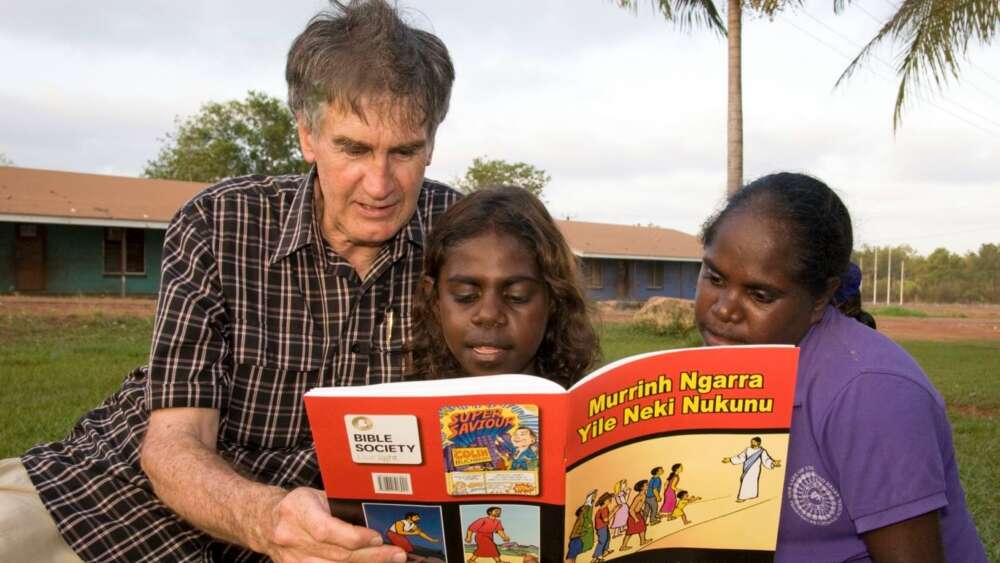Note: Aboriginal and Torres Strait Islander readers are warned that the following story contains images of people who have died.
Lyn Street is eagerly waiting for the long-postponed dedication of the Murrinhpatha Mini Bible in Wadeye on 27 August. She and her husband first began helping to translate the Scriptures into this ancient language 50 years ago. Lyn prays this Bible might create a deep desire in the troubled Top End community to read the Scriptures.
Lyn and Chester Street discovered the need for God’s word in Aboriginal languages when, as young, married Bible college students, they visited friends in Darwin. Until that point, they assumed, as many did back then, that Aboriginal people would read the Bible in English.
“We went to visit friends in Darwin and found out that many Aboriginal people still speak their own language and about the need for Bible translation,” recalls Lyn.
“We were challenged by this and after attending linguistic and training courses we returned to Darwin three years later. After a year of orientation and survey work, Chester visited the community of Port Keats, now known as Wadeye, to do some language assessment. It was obvious to him that people were communicating in Murrinhpatha, the main language spoken there.”
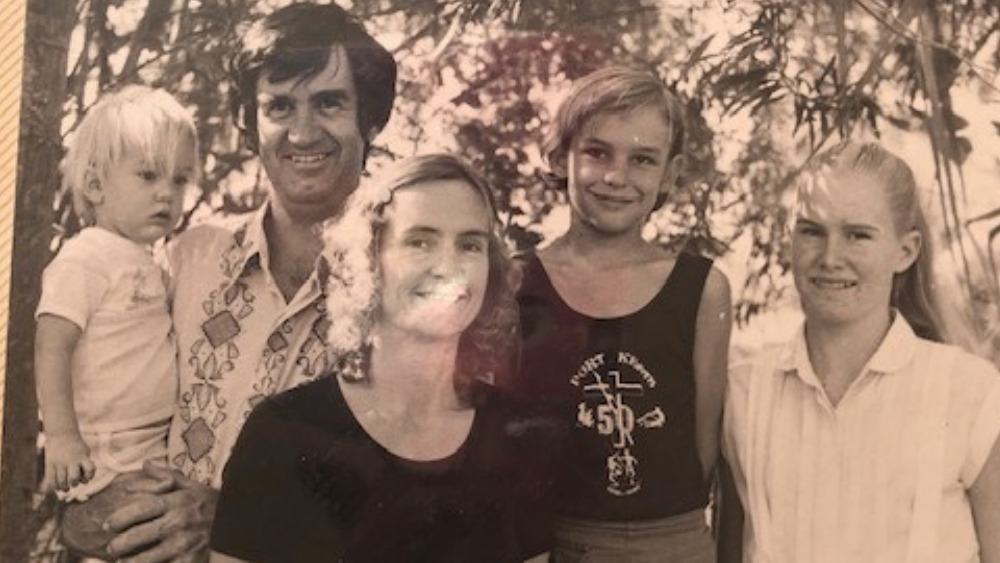
Chester and Lyn Street with their three children Jerilyn, Jeremy and Jamie.
Today, Murrinhpatha is spoken by over 2,500 people in the region of Wadeye. It is one of Australia’s fastest-growing Aboriginal languages, spoken not only by Murrinhpatha people but also by several people groups whose languages are waning or considered extinct in the area.
“It was a privilege to live for so long in a community like that, where people accepted you for who you were.” – Lyn Street
Lyn and Chester’s daughter Jerilyn was just nine months old when they drove a truck towing a mobile home from Darwin to Wadeye in September 1973 to start work with the group today known as AuSIL. Thankfully, they were young and intrepid.
“The road was supposedly dry, but there were quite a few creeks to go through. It took us two days to get there. It was quite primitive in those days. Today there’s a cement causeway over the Daly River, but we had to drive through it. Now you just go over the top. Parts of the road are bitumen, but the road gets graded and rained on and wrecked and graded and rained on. But we were prepared to take on anything!”
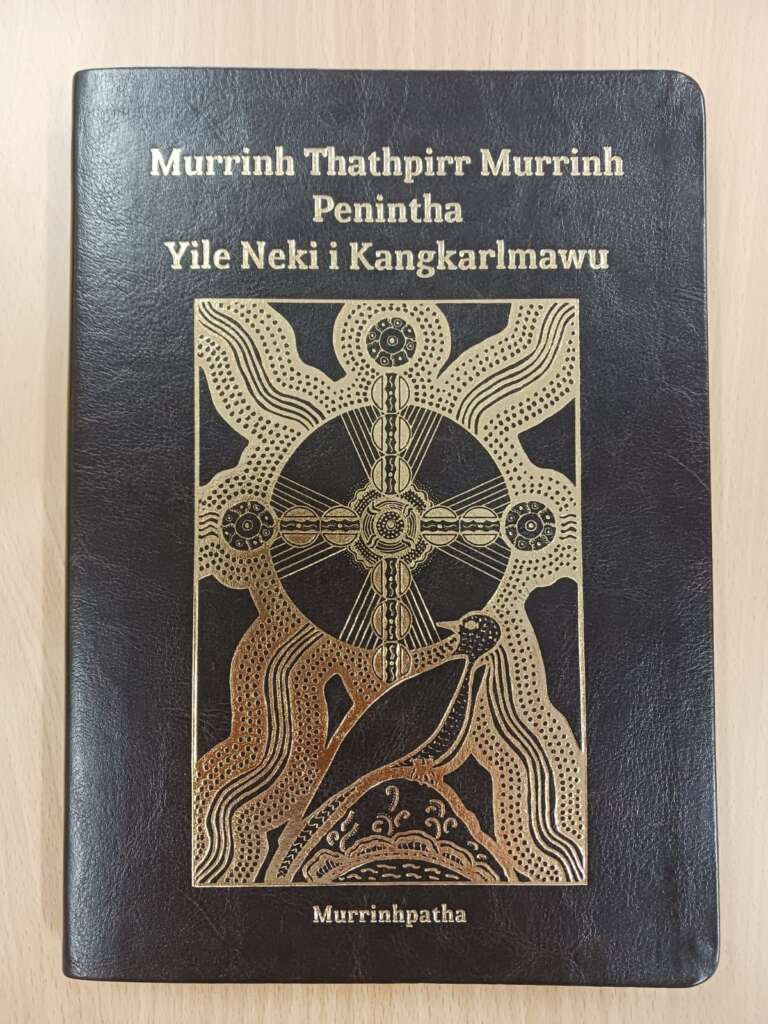
The Murrinhpatha Mini Bible
Lyn considers it a privilege that she, Chester and their three children were able to live and work on Bible translation in Wadeye from 1973 to 1991. Because they wanted to be immersed in the language, they didn’t live near the other white people in the town but among the Aboriginal people, which helped Lyn to form relationships that continue to this day.
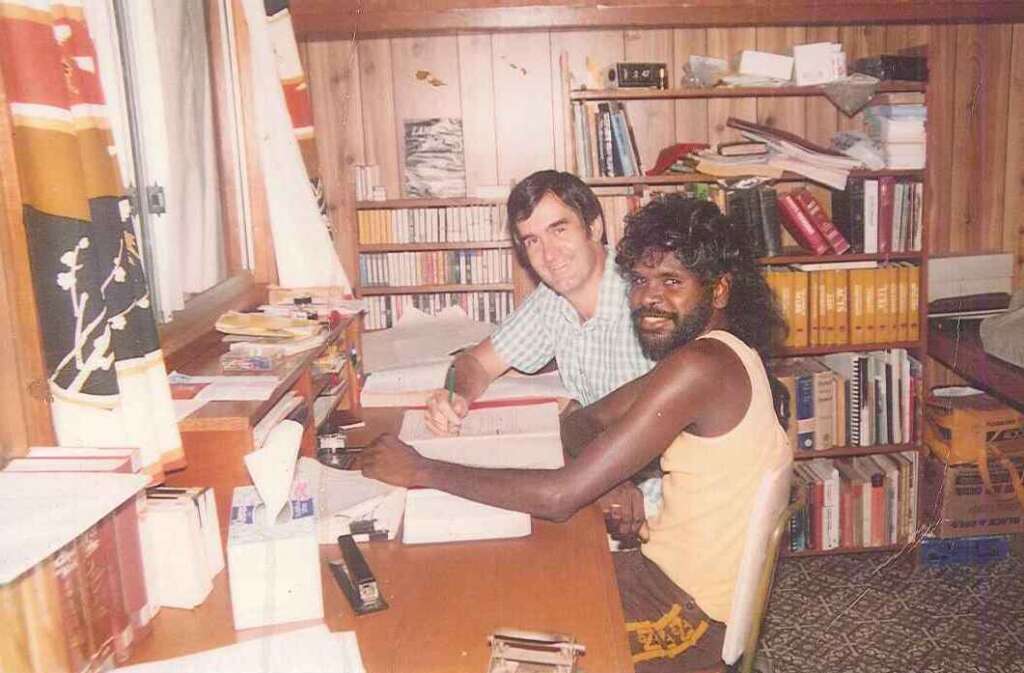
Chester Street working with Marcellino Bunduk on translation of the Murrinhpatha Scriptures.
“We were down near what was called the creek camp, so we heard language all the time. There were people around us. Our children grew up speaking the language. They would make mistakes, but didn’t worry about it. They’d just get corrected and say it properly and then run off and play, not like us adults that don’t want to make mistakes,” she tells Eternity via Zoom from her home in Sydney.
“It was a privilege to live for so long in a community like that, where people accepted you for who you were. Some of the people used to call us ‘those two’ because we weren’t like the other white people, and we weren’t like [the Aboriginal people] either. They appreciated us wanting to get to know them, to relate to them, learn their language as best we could and bring in the gospel message that Jesus loves them and he wants them in his kingdom, as well as other people all around the world. It’s one of the great things of living there and being able to relate to people and encourage them.”
“From the beginning of our relationship, we together had that passion.”
Lyn was just a teenager when she had a dream that changed her life.
“I didn’t come from a Christian family, but I started going to a nearby Sunday school from my house when I was 10 years old. Then I had this dream that God wanted me to be a missionary, which I thought was rather weird, because I didn’t really know much about God at that stage. But I continued going to the little Baptist church and youth group and committed my life to the Lord when I was 15.
“Then the desire to be a missionary grew in my brain. I met my husband at the same church, but when he asked me to marry him, I said, ‘Oh, no, I don’t want to get married. I want to be a missionary and serve Jesus.’ He said, ‘That’s what I want to do too.’ So from the beginning of our relationship, we together had that passion. Thank God for it. Serving together. Seeing God’s work.”
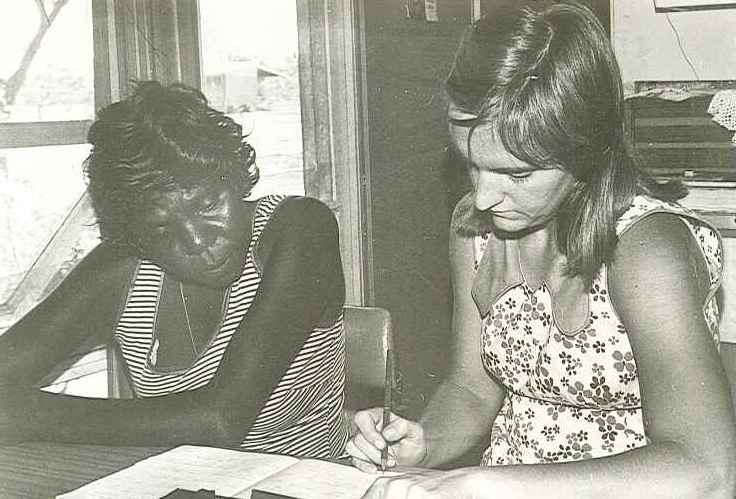
Lyn Street with Theodora Narndu working on Bible stories.
After the Streets left Wadeye in 1991 to enable their children to attend high school in Sydney, Chester and his Wycliffe colleague Dave Wake maintained contact with the community through annual mission trips organised by the Melbourne office of Wycliffe Bible translators.
“He was so pleased that Dave, this white man, keeps wanting to come back to see them. Those relationships are important for both sides.”
Since Chester died from cancer in 2015, Lyn has been three times on the mission trip, called MAD in the Outback.

Lyn Street, right, with Dave Wake, left, and Cassimir Narndu, the eldest son of Theodora Narndu (deceased) and elder of his country, which includes Kurdarntiga, July 2023.
“It’s two-and-a-half weeks in a 22-seater bus, from Melbourne over to Adelaide, up through the centre, Alice Springs and Uluru.
“Then we came up to Beswick Community and had a few days there. The idea is for young people to go into a community where we’ve been invited to go to and observe and make contact with people and friendships. That was really good … Then we went over to Katherine and out to Wadeye.”
The group was supposed to camp for three nights at Kurdantiga beach, outside Wadeye, but the mosquitoes were so bad that after two nights, they had to leave.
“The guy who invited us out there even made a big sign that said, ‘Welcome to Kurdantiga’ because he was so pleased that Dave, this white man, keeps wanting to come back to see them,” Lyn says. “Those relationships are important for both sides.”
“That is one of the great joys of living there – trying to understand how they think and the way they care for one another.”
Lyn was very touched when she attended a funeral in Wadeye a few years ago and people she hadn’t seen for 20 years remembered her.
“A whole lot of us were walking down from the church to the cemetery and people would come up beside me and hold my hand, even though I hadn’t seen some of them for 20 years,” she says.
“More recently, I went back on this mission trip with the young people, just to recognise people, connect with people. That is one of the great joys of living there – trying to understand how they think and the way they care for one another.”
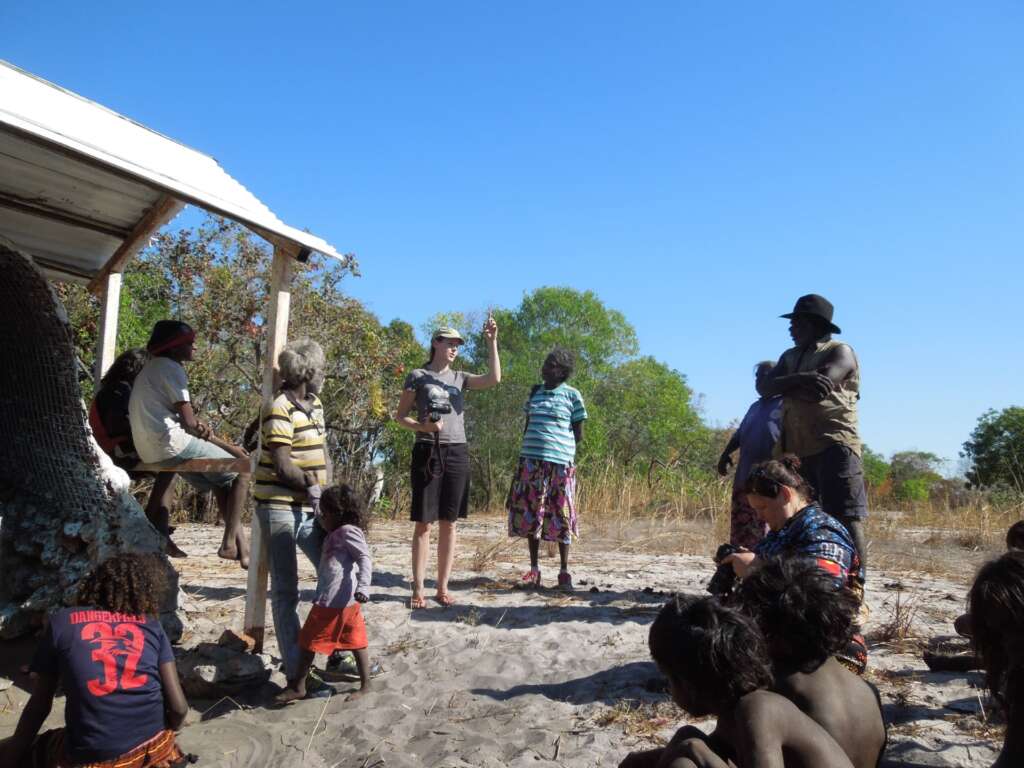
Jerilyn (Lyn & Chester’s daughter), centre, chatting during the 2015 MAD in the Outback tour.
Lyn said the main lesson she learned from her time in Wadeye was “to appreciate people for who they are and not necessarily how they look or how their place looks. Acceptance of the different ways of doing things. You just learn and appreciate people for who they are and what they bring into your life.”
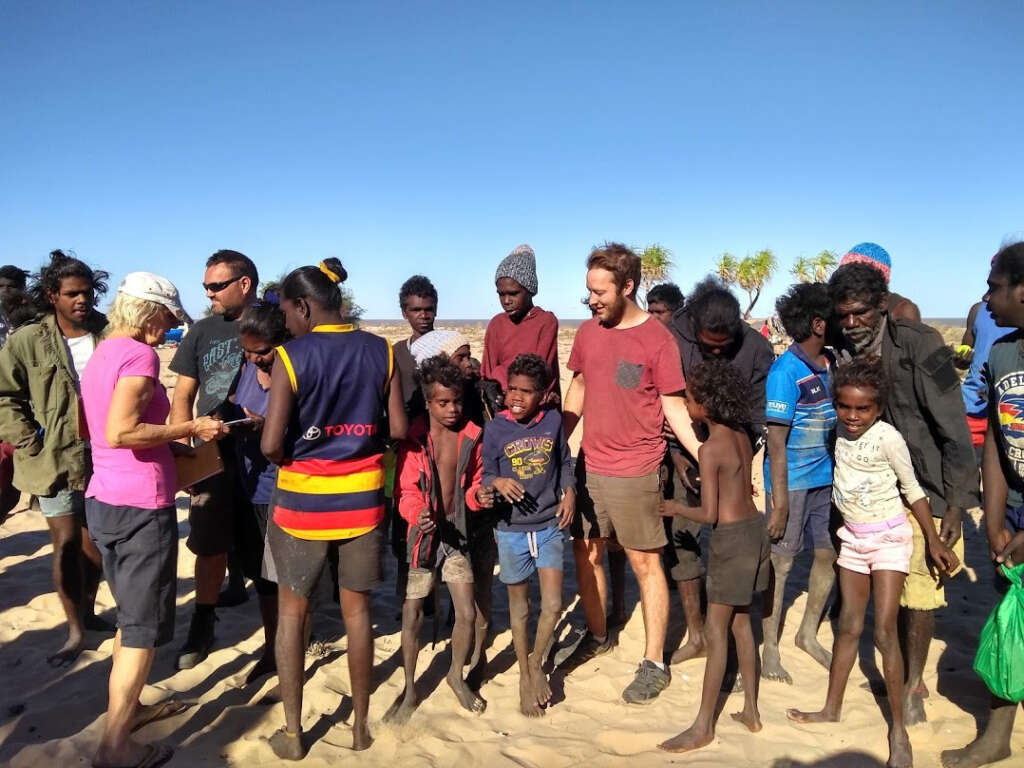
The Nardu families at the Kurangtiga outstation where the group camped on the beach in 2019.
Lyn will travel north with her daughter Jerilyn for the dedication of the Murrinhpatha Mini Bible on 27 August. Bible Society Australia, which published the mini-Bible in 2021, hopes the dedication by Bishop Charles Gauche will help bring healing to the troubled community and will be a time of celebration and thanksgiving for what God has done over many decades to bring his message of love and hope to Murrinhpatha speakers and the wider Port Keats community.
Email This Story
Why not send this to a friend?
